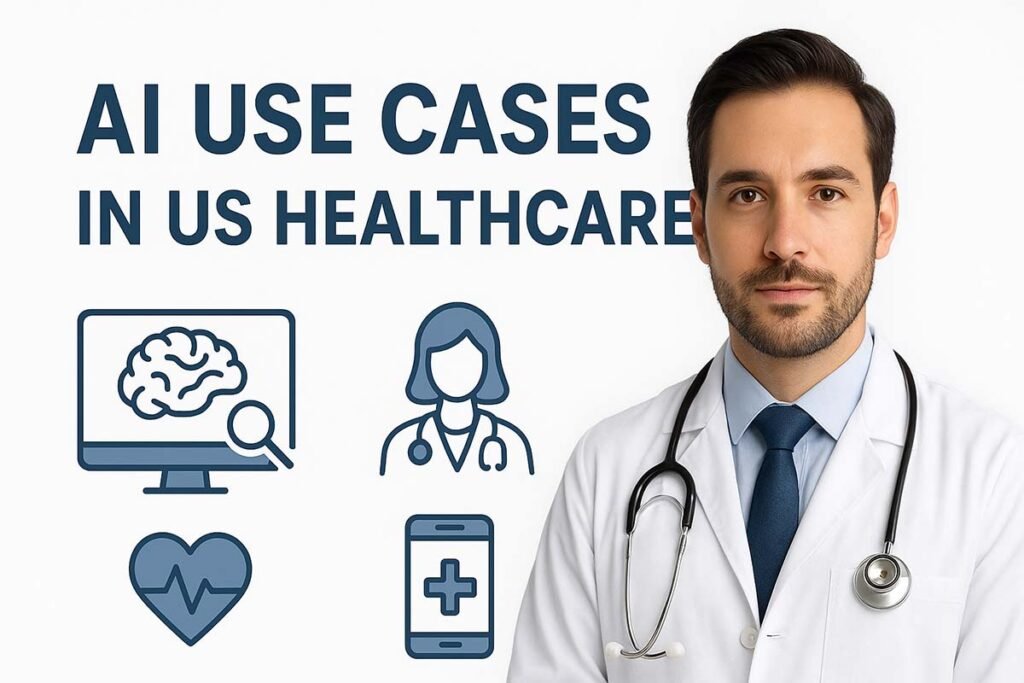Healthcare in the United States is undergoing a monumental transformation, thanks to artificial intelligence (AI). From reducing diagnostic errors to personalizing treatment plans, AI is reshaping patient care at an unprecedented scale. In a country where healthcare costs are high and access to quality care can be uneven, AI-driven tools offer hope for more affordable, accessible, and efficient services.
But what does this revolution mean for everyday patients? How do AI innovations impact your doctor visits, treatment options, or wellness routines? In this detailed guide, we’ll explore the latest AI trends in US healthcare, spotlight impactful patient-focused tools, and share expert insights and real-life case studies. Whether you’re managing chronic conditions or simply staying proactive about your health, discover how AI can empower your journey to wellness in 2025 and beyond.
The Growing Role of AI in US Healthcare
AI technologies are no longer niche experiments; they’re mainstream in American hospitals, clinics, and home health care. According to a 2025 report by the American Medical Association, over 70% of healthcare providers in the US now use AI-powered systems for diagnostics, patient monitoring, and administrative tasks.
AI’s integration addresses critical US healthcare challenges:
- High Costs: AI streamlines workflows, reduces redundant tests, and optimizes resource allocation.
- Healthcare Access Disparities: Virtual AI tools extend specialty care to rural and underserved communities.
- Chronic Disease Management: AI helps detect patterns and predict flare-ups early.
AI-Powered Diagnostic Tools
Medical Imaging & Radiology
AI algorithms analyze X-rays, MRIs, and CT scans faster and often more accurately than human radiologists. For example:
- Aidoc: FDA-approved AI reads scans for signs of stroke or pulmonary embolism, alerting radiologists immediately.
- Zebra Medical Vision: Processes vast imaging data to detect abnormalities, reducing missed diagnoses.
Laboratory Testing
- AI automates blood analysis and genomic sequencing to tailor patient care.
- Projects like Tempus combine AI with cancer genomics, pushing precision medicine.
Personalized Treatment and Predictive Analytics
AI models analyze patient histories, genetic data, and social factors to craft customized treatment plans:
- IBM Watson Health: Supports oncology teams by recommending therapies based on global literature and patient profiles.
- Predictive analytics identify high-risk patients for heart disease or diabetes, enabling preventive interventions.
Telemedicine and Virtual Health Assistants
The US telehealth market grew 38% in 2024. AI enhances remote care by providing:
- Virtual Health Assistants: Tools like Ada Health ask symptom-related questions and guide patients to the right care level.
- Appointment Scheduling: AI chatbots automate bookings and reminders.
- Remote Consultations: AI provides decision support to clinicians, improving diagnosis accuracy during virtual visits.
Wearable AI Devices and Remote Monitoring
AI-powered wearables now track vital signs and alert users and doctors about anomalies:
- Apple Watch Series 10: Monitors heart rhythms with FDA clearance for detecting atrial fibrillation.
- Fitbit Premium: Personalized health coaching based on sleep, activity, and stress levels.
- Remote monitoring benefits patients with COPD, CHF, and post-operative care by reducing hospital readmissions.
Mental Health Tech: AI for Emotional Wellness
Mental health care sees increasing AI adoption:
- Woebot: An AI chatbot delivering cognitive behavioral therapy (CBT).
- Wysa: Suggests mindfulness exercises tailored to user mood.
- AI detects speech patterns for early signs of depression or anxiety.
Patient Data Security and Ethical Considerations
AI’s reliance on data raises privacy concerns, especially with HIPAA regulations in the US. Leading AI healthcare providers emphasize:
- End-to-end encryption
- Consent management
- Transparent AI decision-making processes
Regulators and organizations like the FDA continuously evolve frameworks, balancing innovation and safety.
Real-Life Case Studies and Success Stories
Case Study 1: Stanford University’s AI Detects Pneumonia
An AI model outperformed radiologists in pneumonia detection accuracy, streamlining critical care in Californian hospitals.
Case Study 2: Mayo Clinic’s AI-Powered COVID-19 Patient Management
AI predicted patient outcomes and optimized ventilator allocation during the pandemic peak, saving lives.
Case Study 3: Telehealth Success with Teladoc Health
Millions of Americans accessed AI-assisted virtual primary care, reducing wait times and improving chronic disease management.
Benefits of AI for Patients
- Faster, more accurate diagnoses
- More personalized care plans
- Easy access via telemedicine and wearables
- Improved chronic disease monitoring
- Enhanced mental health support anytime, anywhere
Potential Challenges and How They’re Addressed
- Bias in Algorithms: Ongoing research to diversify training data and improve fairness.
- High Costs of Advanced AI: Insurance increasingly covers AI-backed diagnostic tests.
- Technical Barriers: User-friendly apps and better patient education reduce hurdles.
- Privacy Concerns: Stringent compliance and audits maintain trust.

Expert Opinions: Industry Leaders Weigh In
“AI’s biggest potential is democratizing healthcare—making expert-level care accessible even in remote US regions.”
– Dr. Anita Desai, Harvard Medical School
“The blend of human empathy with AI precision leads to the best outcomes. Patients feel heard and seen.”
– Dr. James Keller, Cleveland Clinic
Getting Started: How Patients Can Access AI Tools Today
- Check if your healthcare provider offers AI-enabled services.
- Use trusted AI symptom checkers like Ada Health.
- Consider FDA-approved wearables for condition monitoring.
- Explore mental health apps offering AI chat support.
- Stay informed of insurance coverage options for AI-backed diagnostics.
Embracing AI for Better Patient Care
The AI revolution in US healthcare isn’t just about technology—it’s about empowering you as a patient. With growing accessibility, personalized insights, and life-saving tools, AI is becoming a trusted partner on your healthcare journey. By understanding and embracing this new era, you gain not only control but also confidence in managing your health.
Start exploring AI health tools today, talk to your provider, and take advantage of innovations designed to keep America healthier, smarter, and stronger.
FAQ: AI and Healthcare in the USA
Q1: Are AI diagnostic tools reliable?
A1: Yes, many are FDA-approved and validated by clinical studies.
Q2: Can AI replace doctors?
A2: No—AI supports, not replaces, human clinical judgment.
Q3: Are AI health apps covered by insurance?
A3: Some diagnostics and telehealth services with AI components are covered.
Q4: Is my health data safe with AI platforms?
A4: Leading providers use strict encryption and comply with HIPAA.
Q5: Can AI help with mental health?
A5: Yes, there are specialized AI apps and chatbots for emotional support.
Q6: How do I find AI-enabled providers?
A6: Ask your hospital or health network or check their website.




Pingback: Top AI Writing & Content Creation Tools for US Marketers in 2025 - FirstsPost
Pingback: AI for Social Media Growth: Best Tools for American Influencers and Small Businesses - FirstsPost
Pingback: AI in Healthcare Diagnostics 2025: Breakthroughs and Impact on US Medical Sector - FirstsPost